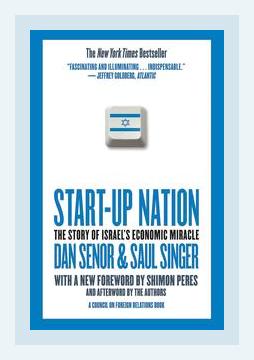Entrepreneurship and StartupsTech Startups
Introduction
“Start-Up Nation: The Story of Israel’s Economic Miracle,” written by Dan Senor and Saul Singer in 2009, explores how Israel, a small country with limited natural resources, has managed to become a global leader in technology and innovation. The book delves into the cultural, historical, and societal factors that have driven Israel’s entrepreneurial spirit and economy. Using a range of concrete examples, Senor and Singer provide insights into the mechanisms behind Israel’s success and offer actionable advice for entrepreneurs and policymakers alike.
Major Points and Actions
1. Military Influence and Education
Point: One of the unique aspects of Israeli society that contributes to its high rate of entrepreneurship is the influence of the military. The Israeli Defense Forces (IDF) instills a range of skills and values, such as leadership, teamwork, and a readiness to handle crises. Units like the IDF’s intelligence unit 8200 are particularly famous for producing tech-savvy entrepreneurs.
Example: Check Point Software, a leading cybersecurity firm, was founded by veterans of Unit 8200. This unit is known for developing expertise in cyber intelligence, which translates well to entrepreneurial ventures.
Action: Entrepreneurs can foster similar environments in their organizations by emphasizing teamwork, resilience, and leadership training. They can also look to recruit veterans who bring valuable skills acquired in military service.
2. High Value Placed on Education and Talent
Point: Israel places an enormous emphasis on education and has one of the highest rates of university degrees per capita in the world. The country’s educational institutions are deeply tied to its technological and entrepreneurial ecosystem.
Example: The Technion – Israel Institute of Technology, in Haifa, is often referred to as Israel’s equivalent of MIT. Many successful tech companies, like Intel Israel, have strong affiliations with Technion graduates.
Action: Individuals and companies should prioritize continual learning and skill development. Establishing partnerships with academic institutions can also foster innovation and provide a steady talent pipeline.
3. Immigration and Diversity
Point: Israel’s diversity, stemming from its waves of immigration, has brought a variety of skills, perspectives, and a resilient mindset. Immigrants often bring with them a capacity for risk and a fresh outlook, which can be vital for entrepreneurial success.
Example: Many of the people who emigrated from the former Soviet Union are highly skilled in tech and science, significantly bolstering Israel’s human capital.
Action: Encourage diversity and inclusivity within teams and organizations. Create pathways for skilled immigrants to integrate and contribute to the tech ecosystem.
4. Government Support and Policy
Point: The Israeli government plays a proactive role in fostering a start-up ecosystem. Policies are in place to support R&D and innovation, and initiatives like the Office of the Chief Scientist offer grants and incentives.
Example: The Yozma program, launched in the 1990s, made significant venture capital available to start-ups, catalyzing the tech industry’s growth.
Action: Policy makers should develop and promote similar programs that provide financial support and incentives for R&D. Entrepreneurs can seek out available grants and government-backed funding to advance their ventures.
5. Unique Cultural Traits
Point: Certain cultural traits like ‘chutzpah’—a concept that captures audacity or boldness—embody the Israeli approach to business and innovation. Israelis tend to be unfiltered, direct, and willing to challenge authority, which facilitates rapid problem-solving and decision-making.
Example: Even in hierarchical settings like the military, soldiers are encouraged to question decisions and contribute ideas. This cultural attitude carries over into business environments, fostering innovation.
Action: Cultivate a culture where questioning the status quo and constructive criticism are encouraged. Ensure that team members feel empowered to voice their ideas and take calculated risks.
6. Collaborative Ecosystem
Point: Israel’s start-up ecosystem is highly collaborative. There are many networking events, incubators, and co-working spaces that encourage knowledge sharing and partnership.
Example: Tel Aviv is often at the heart of this collaborative ecosystem, hosting events like the annual DLD Tel Aviv Innovation Festival, which brings together tech leaders from around the world.
Action: Participate in or create platforms for networking and collaborative innovation. Leveraging incubators and community events can facilitate valuable connections and partnerships.
7. Focus on Global Market
Point: Due to the small size of the Israeli domestic market, Israeli start-ups are born global, developing products with international applicability and scale in mind.
Example: Waze, a GPS navigation software company acquired by Google, targeted a global market from its inception, which was crucial for its growth and eventual acquisition.
Action: From the outset, design products and services with the global market in mind. Emphasize scalability and international standards to maximize growth potential.
8. Failure Tolerance
Point: In Israel, failure is not seen as a stigma but rather as a learning opportunity. This perspective encourages taking risks, which is essential for innovation.
Example: Many of Israel’s successful entrepreneurs have experienced multiple failures before finding success. This is seen as a badge of honor rather than a detriment.
Action: Cultivate an environment where failure is accepted as part of the learning process. Encourage team members to take calculated risks without the fear of punitive consequences for failure.
Conclusion
“Start-Up Nation” provides a comprehensive look into the myriad factors contributing to Israel’s unique success story in the tech startup world. From cultural attitudes like chutzpah and failure tolerance, to structural supports such as military training and government policy, the book offers insights that can be applied globally. By understanding these key elements, entrepreneurs and policymakers can craft environments that inspire innovation and resilience, driving economic growth and technological advancement.
